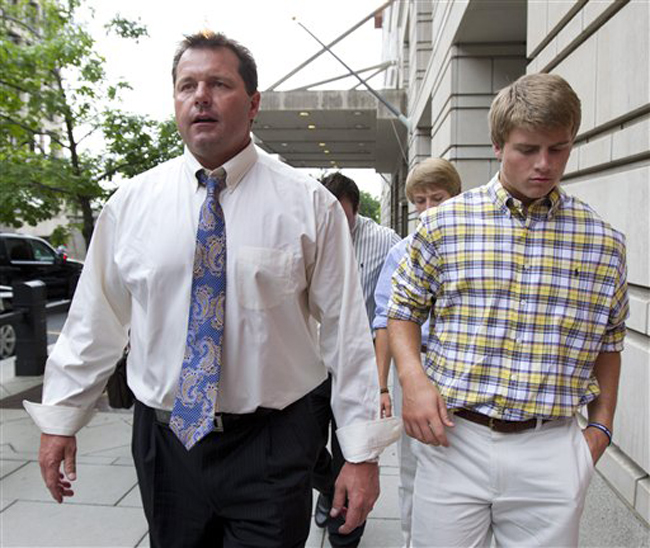WASHINGTON — Former baseball star Roger Clemens was acquitted Monday on all charges that he obstructed and lied to Congress when he denied using performance-enhancing drugs as a fast-balling pitcher.
The trial was lengthy, the deliberations relatively brief. Jurors returned their verdict after close to 10 hours over several days. The outcome ended a 10-week trial that capped an expensive, five-year investigation into one of the greatest pitchers in the history of baseball.
Shortly after the verdict was read, Clemens and his family engaged in hugs in the courtroom including one large group hug. At one point, wife Debbie Clemens dabbed Roger Clemens’ eyes with a tissue.
Clemens, 49, was charged with two counts of perjury, three counts of making false statements and one count of obstructing Congress when he testified at a deposition and at a nationally televised hearing in February 2008. The charges centered on his repeated denials that he used steroids and human growth hormone during a 24-year career produced 354 wins and a record seven Cy Young Awards.
The verdict was the latest blow to the government’s legal pursuit of athletes accused of illicit drug use.
A seven-year investigation into home run king Barry Bonds yielded a guilty verdict on only one count of obstruction of justice in a San Francisco court last year, with the jury deadlocked on whether Bonds lied to a grand jury when he denied knowingly taking performance-enhancing drugs.
A two-year, multicontinent investigation that looked into possible drug use by cyclist Lance Armstrong was recently closed with no charges brought, though the U.S. Anti-Doping Agency filed formal accusations last week that could strip the seven-time Tour de France winner of his victories in that storied race. Armstrong denies any doping
The Clemens outcome also comes on the heels of the Department of Justice’s failure to gain a conviction in the high-profile corruption trial of former presidential candidate John Edwards.
In addition, the first attempt to try Clemens last year ended in a mistrial when prosecutors played a snippet of video evidence that had previously been ruled inadmissible.
The government’s case relied heavily on the testimony of Clemens’ longtime strength coach, Brian McNamee, who testified he injected Clemens with steroids in 1998, 2000 and 2001 and with HGH in 2000. McNamee produced a needle and other materials he said were from a steroids injection of Clemens in 2001, items that McNamee said he stored in and around a Miller Lite beer can inside a FedEx box for some six years.
But McNamee was the only person to claim firsthand knowledge of Clemens using steroids and HGH, and even prosecutors conceded their star witness was a “flawed man.” Clemens’ lawyers relentlessly attacked McNamee’s credibility and integrity. They pointed out that his story had changed over the years and implied that he conjured up the allegations against Clemens to placate federal investigators.
Some items associated with the beer can were found to have Clemens’ DNA and steroids, but the defense called the evidence “garbage” and claimed it had been contaminated or manipulated by McNamee.
Other evidence offered tenuous links between Clemens and performance-enhancing drugs. Former teammate Andy Pettitte recalled a conversation in which Clemens supposedly admitted using HGH, but Pettitte said under cross-examination that there was a “50-50” chance that he had misheard.
Convicted drug dealer Kirk Radomski supplied McNamee with HGH for a starting pitcher and even sent a shipment to Clemens’ house under McNamee’s name, but Radomski had no way of knowing if any of the HGH was specifically used on Clemens. The pitcher’s wife, Debbie, admitted receiving an HGH shot from McNamee, but she and McNamee differed over when the injection occurred and whether Clemens was present.
Clemens’ lawyers contended that the pitcher’s success resulted from a second-to-none work ethic and an intense workout regimen dating to his high school days. They said that Clemens was indeed injected by McNamee — but that the needles contained the vitamin B12 and the anesthetic lidocaine and not performance-enhancing drugs.
Monday’s verdict is unlikely to settle the matter in sports circles as to whether Clemens cheated in the latter stages of a remarkable career that extended well into his 40s — during a period in which performance-enhancing drug use in baseball was thought to be prevalent. Clemens himself told Congress at the 2008 hearing that “no matter what we discuss here today, I’m never going to have my name restored.”
A crucial barometer comes next year, when Clemens’ name appears on the Hall of Fame ballot for the first time. His statistics would normally make him a shoo-in for baseball’s greatest honor, but voters have been reluctant to induct premier players — such as Mark McGwire and Rafael Palmeiro — whose careers were tainted by allegations of drug use.
Clemens capped an outstanding career with age-defying performances well into his 40s. He went 18-4 and won his seventh Cy Young Award at the age of 41, and the next year posted a career-best 1.87 ERA. His 4,672 strikeouts ranked third in baseball history.
Clemens was invited to testify before the House Oversight and Government Reform Committee in 2008 after he publicly denied accusations made in the Mitchell Report on drugs in baseball that he had used steroids and HGH. He first appeared at a congressional deposition, where he said: “I never used steroids. Never performance-enhancing steroids.” He made a similarly categorical denial at a hearing about a week later, appearing alongside McNamee, who stuck to his story.
Soon after, committee chairman Henry Waxman, D-Calif., and ranking member Tom Davis, R-Va., asked the Justice Department to investigate whether Clemens had lied under oath. In 2010, a grand jury indicted him on the six counts. Clemens lawyer Rusty Hardin revealed at the time that federal prosecutors made Clemens a plea offer but the former pitcher rejected it
Send questions/comments to the editors.



Comments are no longer available on this story